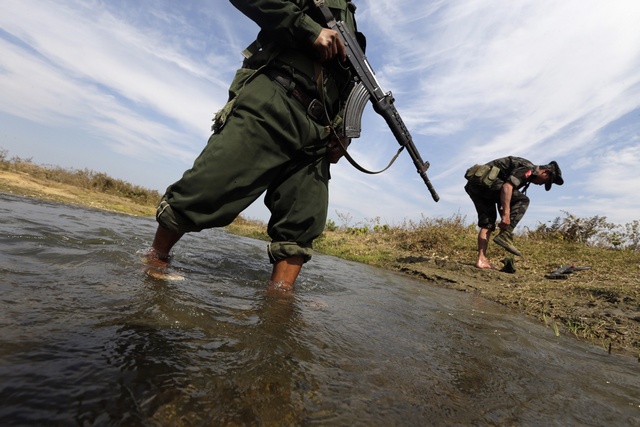Concluding the third day of talks at a plenary meeting in Maijayang on Thursday, the representatives of 17 of Burma’s main ethnic armed groups confirmed their agreement that any future “union army” should be under the control of a civilian government.
The non-binding agreement was reached in the Kachin State town on 28 July following debate on two papers regarding the basic principles of DDR (Disarmament, Demobilisation and Reintegration) and SSR (Security Sector Reform) in a future federal union.
The papers were presented by the eight Nationwide Ceasefire Agreement (NCA) signatory groups and the ethnic alliance United Nationalities Federal Council (UNFC).
A statement released at the end of Thursday’s forum said that a working committee had been formed to discuss the 10 other basic principles suggested in the papers, including the constitution of a future federal union and the protection of citizens.
Under the 2008 constitution, Burma’s armed forces assumes a leading role in all facets of the country’s politics, with military appointees holding 25 percent of seats in all parliaments without competing in elections. The constitution also provides the commander-in-chief the overriding authority in appointing the heads of the crucial ministries of Home Affairs, Defense, and Border Affairs.
[related]
The Maijayang conference was originally scheduled to end on Friday, 29 July, but was extended by one more day – after the weekend break – until 1 August. The meeting is seen as an opportunity for all 17 ethnic armed groups – both signatories and non-signatories to the NCA – to establish common ground ahead of political dialogue with the Burmese government and military, which is due to kick off at the end of next month – negotiations that the government’s de facto leader Aung San Suu Kyi has dubbed the 21st Century Panglong Conference, or 21CPC.
In his opening speech, the acting chairman of Thursday’s forum, Chin National Front Vice-president Salai Lian Hmung Sakhong, said, “The 21st Century Panglong Conference will signify the continuation of our struggle – since the original Panglong Conference in 1947 – to achieve three causes: democracy, ethnic equality, and self-determination.
“We [ethnic minorities] believe we can only achieve a genuine federal union when these three aims are fulfilled.
“Therefore, we would like make a clear statement to both the union of Burma and the world, that we must continue our armed struggle until we achieve these three principles.”
On Friday, delegations from two ethnic militias that are not attending the Maijayang talks – the United Wa State Army and the National Democratic Alliance Army from northern Shan State Special Regions 2 and 4 – met for talks in Naypyidaw with State Counsellor Aung San Suu Kyi and Commander-in-Chief Snr-Gen Min Aung Hlaing.



